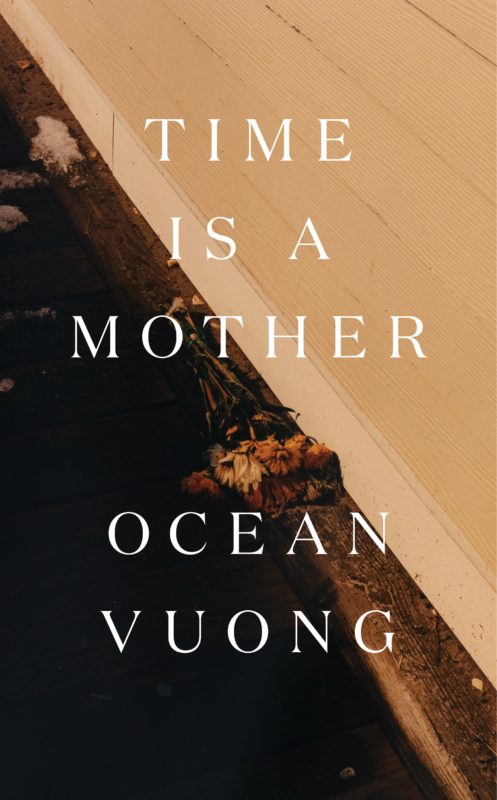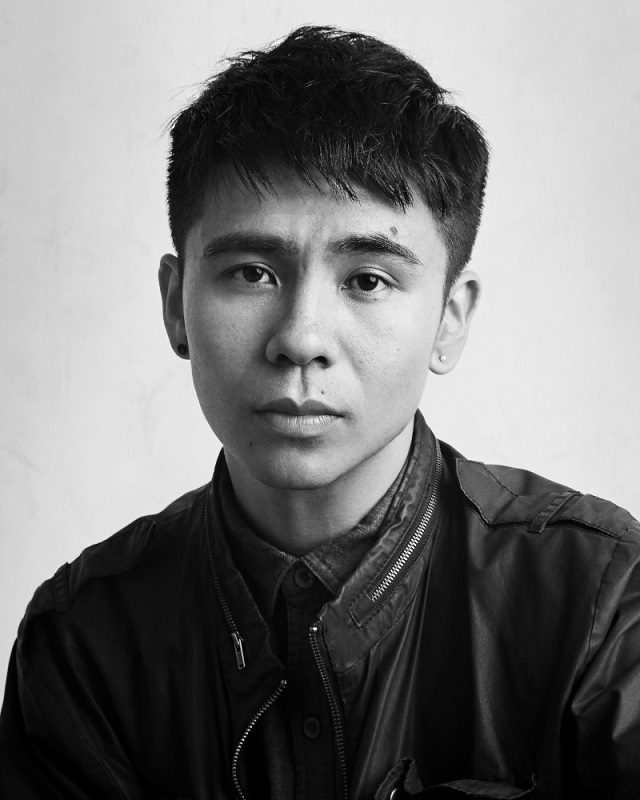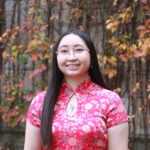
In his sophomore poetry collection, Time is a Mother, Ocean Vuong meditates on how we think about death as individuals and as a community, and how we shoulder the weight of intergenerational trauma. Vuong’s poems turn inward in search for the roots of his life, as he processes the recent loss of his mother and the national acclaim he has achieved since the successful releases of his debut poetry collection Night Sky with Exit Wounds and debut novel On Earth We’re Briefly Gorgeous. Time is a Mother is a diverse set of poems that consciously fulfills, complicates, and exceeds the reader’s expectations of what a queer Vietnamese American poet, now in the public eye, desires to say.
Vuong’s poems confront the tensions of being an acclaimed poet of color in the American publishing industry. He is aware that there are writers who see his queer Vietnamese experiences as literary currency, guaranteeing his success. In the poem “Not Even This,” a young woman he meets at a rooftop party in Brooklyn tells him, “You’re so lucky. You’re gay plus you get to write about war and stuff. I’m just white. [Pause] I got nothing. [Laughter, glasses clinking].” Vuong’s transcription of the white woman’s words, pause, and laughter suggests that these encounters are all too familiar to him throughout his career. “Our sorrow Midas touched. Napalm with a rainbow afterglow,” Vuong writes a few lines later, reductively reconstructing his poetry using America’s familiar terms and associations with the Vietnam War – the traumatic photograph that photojournalist Nick Ut captured of Pham Thi Kim Phuc, or the “napalm girl”; and queerness – the rainbow flag as a symbol of LGBTQ pride, but now so heavily co-opted by corporate America for Pride month, or “rainbow capitalism.” Vuong considers how disturbing it is for complex Vietnamese American narratives of pain to be packaged in the publishing industry.
The interesting persona that Vuong embodies in his poem, “American Legend,” is one way that Vuong engages with this tension. Vuong challenges the expectations that his poems will always take on an autobiographical, confessing “I” persona. Vuong responds to the American gaze by leaning into American tropes, while still imagining a father-son relationship within the boundaries of a poem – an exercise all too familiar to Vuong, given the several poems he’s previously written in Night Sky with Exit Wounds, where he imagines his absent Vietnamese father. In “American Legend,” Vuong paints a Western portrait of the speaker and “my old man” in a Ford truck as they drive to put down their dog, Susan. The poem’s title and the language Vuong uses to present father and son allows for them to distinctively embody white American masculinity, which conflicts with the public image of Vuong’s queer Vietnamese body. That’s not to say that this imagery is at all unfamiliar to Vuong, who grew up in Connecticut; Vuong calls on dirt roads and features of small-town America in the other poems in the collection.
But after the speaker drives and flips the truck over in a devastating crash, this American “I” persona transforms back into Vuong’s more familiar Vietnamese persona who calls “Ma,” his mother, and says:
I did it to hold
my father, to free
my dog. It’s an old story, Ma.
Anyone can tell it.
By referring to what he just narrated as “an old story,” Vuong seems to lean into Americanness – acknowledging the America that he can write about, if he chooses to. Yet, just as quickly, he seems to shrug off the importance of this embodiment, of having laid claim to an American legend, saying casually, “Anyone can tell it.” It is impossible to distill Vuong’s poetic persona. As much as he is labeled as a queer Vietnamese American poet who writes about war, the intrigue of “American Legend” demonstrates that his personal reckonings with an absent father can engage even in the white American landscape.
Yet Vuong takes the public gaze seriously. He continues to be critical of his own imaginings of Vietnamese people. He reflects in “Not Even This”:
My people, so still, in the photographs, as corpses.
My failure was that I got used to it. I looked at us, mangled
under the Time photographer’s shadow, and stopped
thinking, get up, get up.

American newspapers and TV crews heavily documented the war through film and photographs to the point that historians refer to the Vietnam War as the first “living room” war, as suburban families at home could witness war violence and atrocities on their living room TV. These images of the lifeless or victimized Vietnamese were powerful enough to stir Americans to protest the Vietnam War, but Vuong emphasizes the psychological impact of these images on the Vietnamese who lived, like him. Inundated with Vietnam War images in American media and history textbooks, how can a child of immigrants reimagine their ancestors’ stories as more than victims of war? How can a child of immigrants hold these stories and remember survival, remember he is breathing? Vuong refuses to allow “the Time photographer’s shadow” to overtake his perception of his own people, decades after the war.
Vuong boldly decides to transform Vietnamese pain and intergenerational trauma into beauty. “To be a dam for damage,” Vuong continues to write in “Not Even This.” “My shittyness will not enter the world, I thought, and quickly became my own hero.” Deciding that “it will be joy from now on,” the poem ends with Vuong’s rebirth, the image of overcoming intergenerational trauma: “The lights blazed around me into a white weather/ and I was lifted, wet and bloody, out of my mother, into the world, screaming/ and enough.”
Although rich with revelations, “Not Even This” is centrally positioned as a turning point in the collection, rather than a conclusion. It is not possible for anyone, Vuong included, to choose joy and overcome trauma overnight. “Kunstlerroman,” one of the collection’s later poems, shows the poet rewinding the entirety of his artistic life, like scenes from an indie film, tinged in a kind of loneliness. Neither the reader nor the poet himself knows what to expect at the end, the origin. The idea of watching the narrative of one’s own life backwards is a metaphor for finding one’s roots, and Vuong depicts this as a dramatic, possibly shattering process. But ultimately, the speaker calmly watches his life disassemble and is able to say, “I am starting to root for him, on his way to dust.”
Vuong’s poetry does not aim to project a narrative of healing and overcoming intergenerational trauma onto others. In “Nothing,” the speaker shovels snow with Peter, his partner: “This man and I, we take what will vanish anyway and move it aside, making space.” The speaker witnesses the way Peter silently copes with his family’s history, how he understands that he is named after his Jewish grandmother’s brother who died fleeing Stalin:
The brother under rubble, his name everywhere around her like the snow falling on your face forty years later …
I know, too, as I reach across the table to brush the leftover ice from your beard, that it’s already water. It’s nothing, you say, laughing for the first time in days. It’s really nothing. And I believe you. I shouldn’t, but I do.
The snow is a metaphor for the memories of the dead and history as it weighs upon the living, as unmet expectations and guilt. With time, the snow will melt, and the pain can be transformed into something else. Vuong speaks nearby his partner’s pain and offers company and comfort. He does not try to fix or devalidate Peter’s insistence that he’s dealing with “nothing.” His tender “I believe you” holds faith and an understanding that we are on individual journeys of healing and making sense of our history, but we can accompany each other in that process, with care and humility. Vuong reframes death and mourning as lonely processes into something communal, as he writes in “Not Even This”: “Lest we forget, a morgue is also a community center.”
The poems of Time is a Mother contends with the radical possibility that children of immigrants, in their unique, imperfect experiences of being American and receiving their parents’ culture, can allow themselves to become a steady, generative root for the future. The pain, guilt, shame, and intergenerational trauma in the immigrant family can be transformed into something more tender, more gentle, like beauty. There is no doubt that Vuong is the root for many diasporic Vietnamese writers. By inviting the reader into the space of his poems and the stillness and intimacy that the form holds, as he explores his roots, Vuong has generated room for more Vietnamese to process their past, also through art. “Let the stanza be one room then,” Vuong writes in “Nothing,” a one-stanza poem. “Let it be big enough for everyone, even the ghosts rising now from this bread we tear open to see what we’ve made of each other.”
Time is a Mother
by Ocean Vuong
Penguin Books, $24.00
Contributor’s Bio
 Cathy Duong is a current junior at Yale, majoring in English. She enjoys (over)analyzing all things Vietnamese, from the briefest references to Vietnam in Western pop culture, to art, literature, and film created by the talented Viet diaspora.
Cathy Duong is a current junior at Yale, majoring in English. She enjoys (over)analyzing all things Vietnamese, from the briefest references to Vietnam in Western pop culture, to art, literature, and film created by the talented Viet diaspora.


